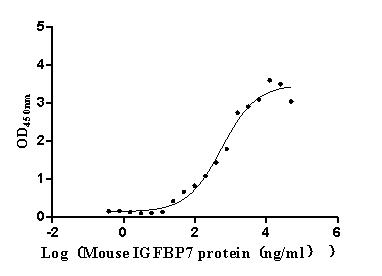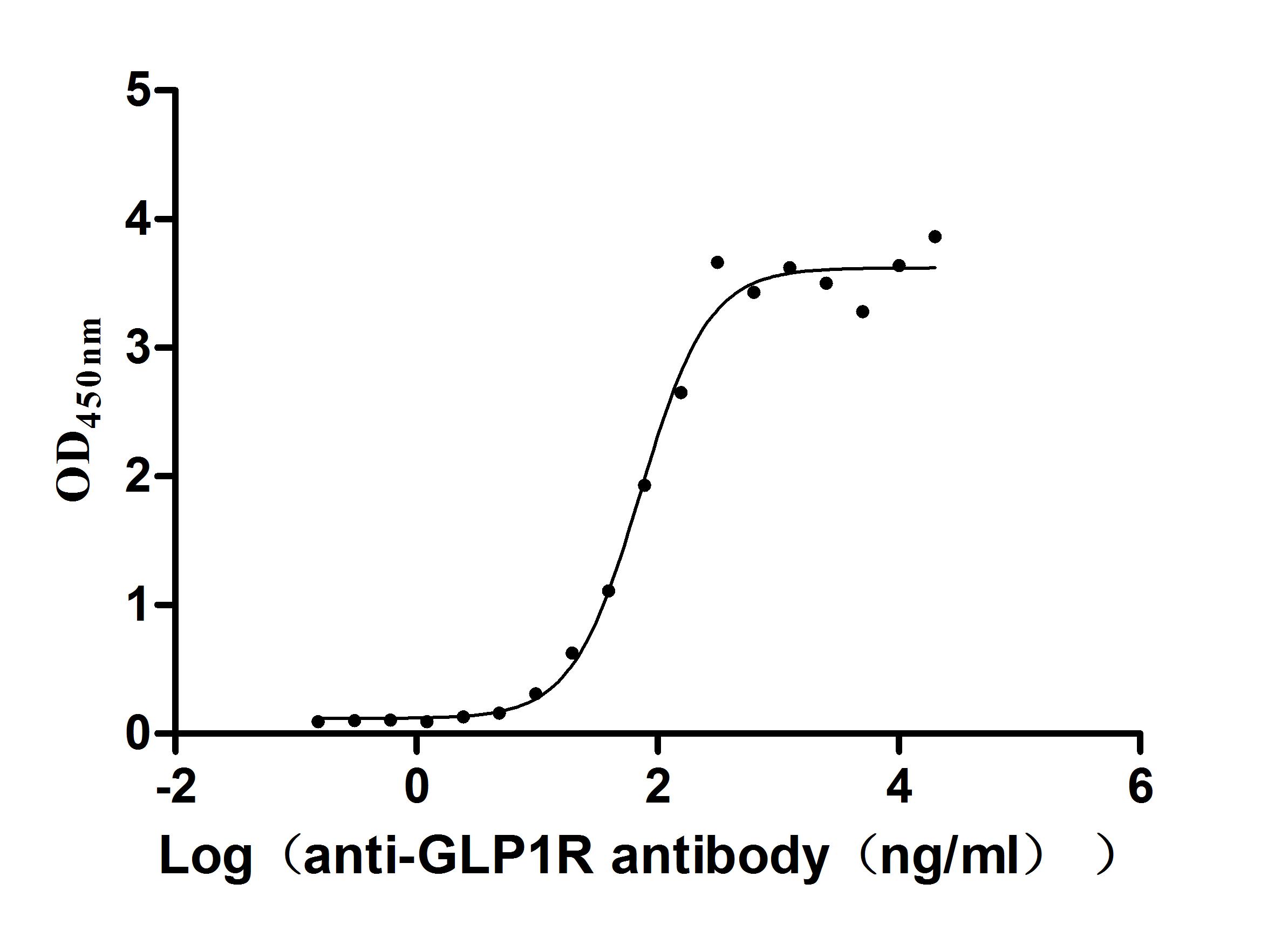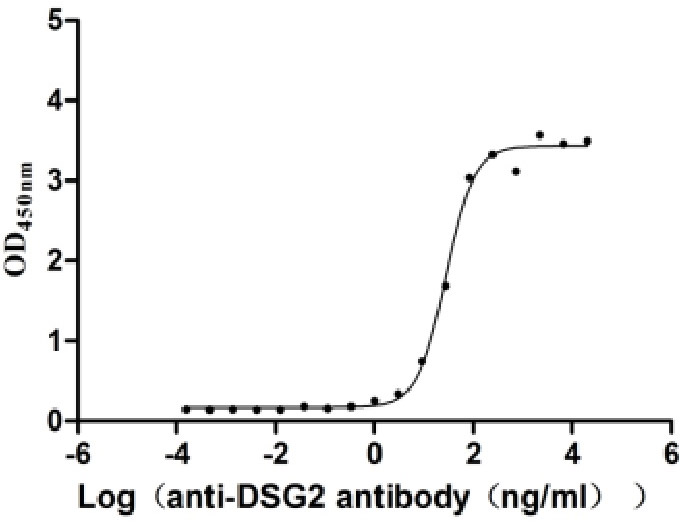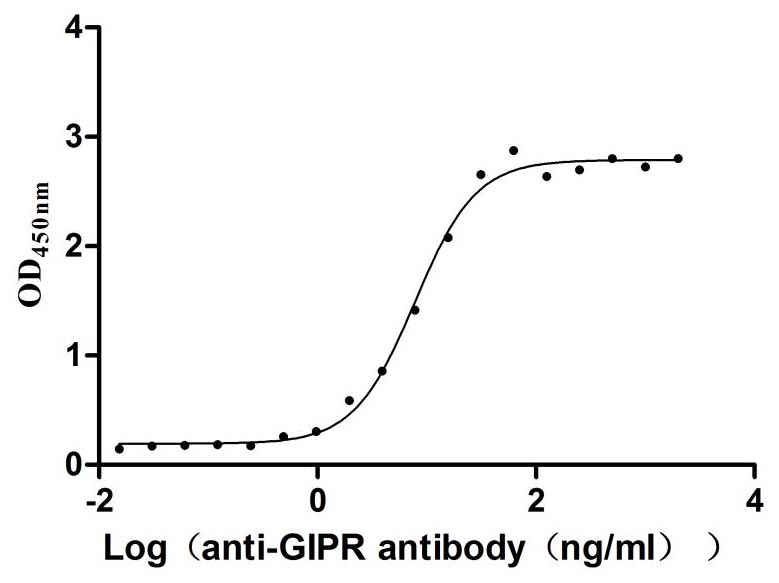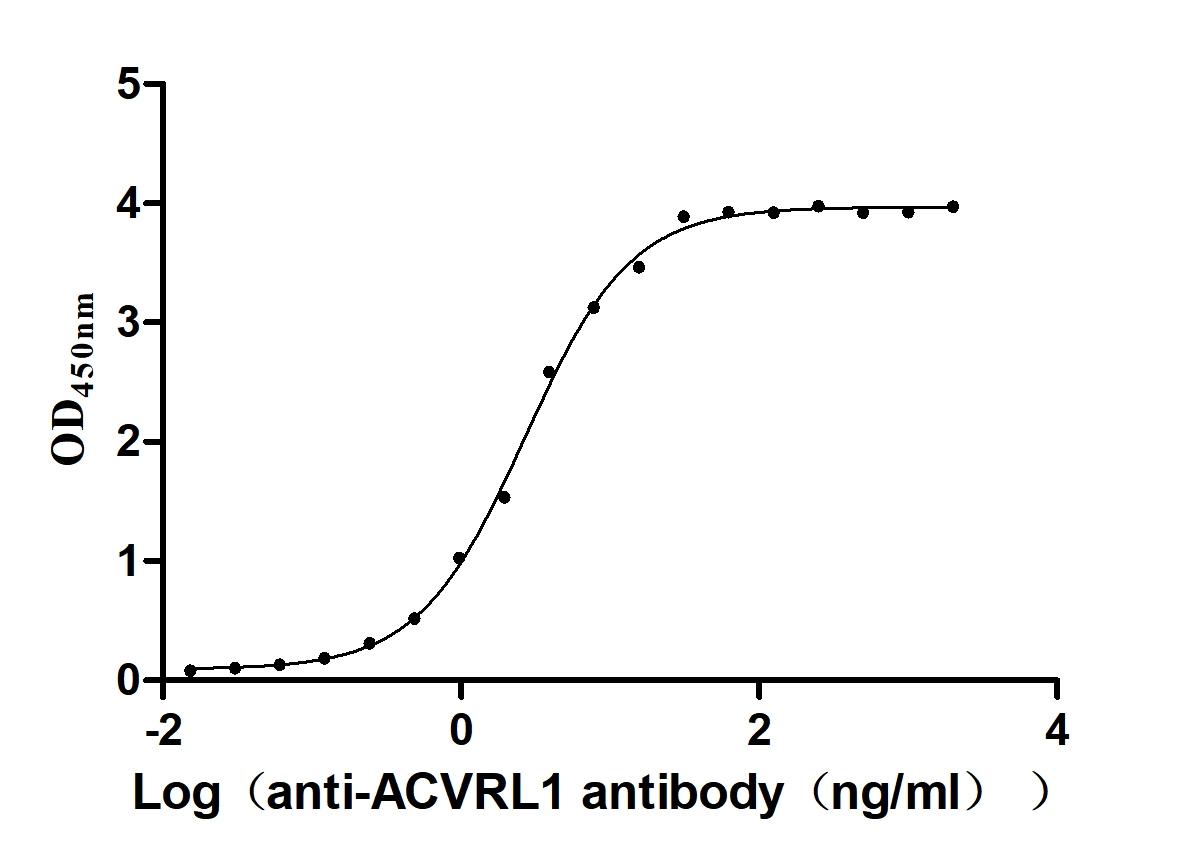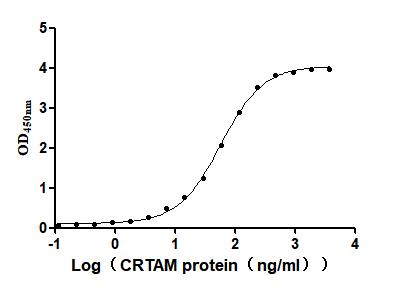Recombinant Human Carboxypeptidase E (CPE)
-
货号:CSB-YP005886HU
-
规格:
-
来源:Yeast
-
其他:
-
货号:CSB-EP005886HU-B
-
规格:
-
来源:E.coli
-
共轭:Avi-tag Biotinylated
E. coli biotin ligase (BirA) is highly specific in covalently attaching biotin to the 15 amino acid AviTag peptide. This recombinant protein was biotinylated in vivo by AviTag-BirA technology, which method is BriA catalyzes amide linkage between the biotin and the specific lysine of the AviTag.
-
其他:
-
货号:CSB-BP005886HU
-
规格:
-
来源:Baculovirus
-
其他:
-
货号:CSB-MP005886HU
-
规格:
-
来源:Mammalian cell
-
其他:
产品详情
-
纯度:>85% (SDS-PAGE)
-
基因名:CPE
-
Uniprot No.:
-
别名:Carboxypeptidase E; Carboxypeptidase H; Carboxypeptidase H precursor; CarboxypeptidaseE; CarboxypeptidaseH; CBPE_HUMAN; Cobalt stimulated chromaffin granule carboxypeptidase; CPE; Cph 1; CPH; Enkephalin convertase; Entephalin convertase; Insulin granule associated carboxypeptidase; Prohormone processing carboxypeptidase; Prohormone-processing carboxypeptidase
-
种属:Homo sapiens (Human)
-
蛋白长度:Full Length of Mature Protein
-
表达区域:43-476
-
氨基酸序列LQQEDGIS FEYHRYPELR EALVSVWLQC TAISRIYTVG RSFEGRELLV IELSDNPGVH EPGEPEFKYI GNMHGNEAVG RELLIFLAQY LCNEYQKGNE TIVNLIHSTR IHIMPSLNPD GFEKAASQPG ELKDWFVGRS NAQGIDLNRN FPDLDRIVYV NEKEGGPNNH LLKNMKKIVD QNTKLAPETK AVIHWIMDIP FVLSANLHGG DLVANYPYDE TRSGSAHEYS SSPDDAIFQS LARAYSSFNP AMSDPNRPPC RKNDDDSSFV DGTTNGGAWY SVPGGMQDFN YLSSNCFEIT VELSCEKFPP EETLKTYWED NKNSLISYLE QIHRGVKGFV RDLQGNPIAN ATISVEGIDH DVTSAKDGDY WRLLIPGNYK LTASAPGYLA ITKKVAVPYS PAAGVDFELE SFSERKEEEK EELMEWWKMM SETLNF
-
蛋白标签:Tag type will be determined during the manufacturing process.
The tag type will be determined during production process. If you have specified tag type, please tell us and we will develop the specified tag preferentially. -
产品提供形式:Lyophilized powder
Note: We will preferentially ship the format that we have in stock, however, if you have any special requirement for the format, please remark your requirement when placing the order, we will prepare according to your demand. -
复溶:We recommend that this vial be briefly centrifuged prior to opening to bring the contents to the bottom. Please reconstitute protein in deionized sterile water to a concentration of 0.1-1.0 mg/mL.We recommend to add 5-50% of glycerol (final concentration) and aliquot for long-term storage at -20℃/-80℃. Our default final concentration of glycerol is 50%. Customers could use it as reference.
-
储存条件:Store at -20°C/-80°C upon receipt, aliquoting is necessary for mutiple use. Avoid repeated freeze-thaw cycles.
-
保质期:The shelf life is related to many factors, storage state, buffer ingredients, storage temperature and the stability of the protein itself.
Generally, the shelf life of liquid form is 6 months at -20°C/-80°C. The shelf life of lyophilized form is 12 months at -20°C/-80°C. -
货期:Delivery time may differ from different purchasing way or location, please kindly consult your local distributors for specific delivery time.Note: All of our proteins are default shipped with normal blue ice packs, if you request to ship with dry ice, please communicate with us in advance and extra fees will be charged.
-
注意事项:Repeated freezing and thawing is not recommended. Store working aliquots at 4°C for up to one week.
-
Datasheet :Please contact us to get it.
相关产品
靶点详情
-
功能:Sorting receptor that directs prohormones to the regulated secretory pathway. Acts also as a prohormone processing enzyme in neuro/endocrine cells, removing dibasic residues from the C-terminal end of peptide hormone precursors after initial endoprotease cleavage.
-
基因功能参考文献:
- Our results implicate a novel role for Carboxypeptidase E that mainly affects the expression of motility-associated genes via several signal pathways PMID: 28656234
- This study has uncovered a human CPE/NF-alpha1 gene mutation that could lead to comorbidity of dementia and depression, emphasizing the importance of this gene in cognitive function. PMID: 27922637
- CPE through its N'-terminal sequence, forms aggregates with Wnt3a and possible endoplasmic reticulum (ER) stress leading to its loss of function. PMID: 27375026
- we have identified a novel SNP in the CPE gene which results in the loss of its neuroprotective function in cells and may confer neurological disorders in humans PMID: 28114332
- High-level CPE [ carboxypeptidase E] expression was associated with a poor prognosis in early-stage cervical cancer. CPE may serve as a biomarker for predicting PLNM [ pelvic lymph node metastasis ] and survival in these patients. PMID: 26695643
- Low carboxypeptidase E expression is associated with recurrence in early-stage hepatocellular carcinoma. PMID: 26803519
- Down-expression of liver carboxypeptidase E may reduce the secretion of serum cholecystokinin and contribute to the formation of cholesterol gallstone. PMID: 26228366
- Downregulation of CPE regulates cell proliferation and chemosensitivity in pancreatic cancer. PMID: 25374060
- Disruption of insulin receptor (IR) expression in beta cells has a direct impact on the expression of the convertase enzyme carboxypeptidase E (CPE) by inhibition of the eukaryotic translation initiation factor Eif4g1. PMID: 24843127
- Upregulation of CPE promotes cell proliferation and tumorigenicity in colorectal cancer. PMID: 24006921
- Data suggest that splice variant of carboxypeptidase E (CPE-DeltaN) that CPE-DeltaN expression might be a potential prognostic marker for colorectal cancer patients. PMID: 23852859
- CPE is essential in the process and targeting of neuropeptides and neurotrophins, its participation in the pathological progression of Alzheimer's disease may be suggested PMID: 22998035
- CPE forms a complex, probably through sequences located at its N-terminal domain, with Wnt3a and the extracellular cysteine rich domain of Fz1. PMID: 22824791
- Neither high glucose nor insulin (with low glucose) regulates beta-cell CPE (but either up-regulates CPD). PMID: 21628999
- an N-terminal truncated carboxypeptidase E splice isoform induces tumor growth and is a biomarker for predicting future metastasis in human cancers PMID: 21285511
- CPE may play a role in promoting tumor growth and invasion. PMID: 21061162
- Carboxypeptidase E is differently expressed in subcutaneous and visceral fat of obese subjects PMID: 12530526
- protein binding with Con A in seminal plasma PMID: 14690244
- cDNA microarray analysis led to the identification of 2 novel biomarkers that should facilitate molecular diagnosis and further study of pulmonary neuroendocrine tumors. PMID: 15492986
- A possible role for mutations in CPE in the development of coronary heart disease. PMID: 17957445
- the severity of the coronary atherosclerosis estimated by Gensini score was significantly influenced by the presence of the A2925G mutant and G2855A mutant of the CPE gene PMID: 18080843
- polymorphism in the CPE exon5 gene may contribute to the angiographical characteristics of coronary atherosclerosis in the Chinese population PMID: 18501121
- Carboxypeptidase E degradation contributes to palmitate-induced beta-cell ER stress and apoptosis; CPE is a major link between hyperlipidemia and beta-cell death pathways in diabetes. PMID: 18550819
- CPH-Abs may allow discrimination of a more latent subset of adult-onset autoimmune diabetes (LADA). PMID: 19120309
- Carboxypeptidase E may be a key molecule to regulate Caspr2 (carboxypeptidase E) trafficking to the cell membrane. PMID: 19166515
- missense polymorphism encoding altered activity PMID: 11462236
显示更多
收起更多
-
亚细胞定位:[Isoform 1]: Cytoplasmic vesicle, secretory vesicle. Cytoplasmic vesicle, secretory vesicle membrane; Peripheral membrane protein. Secreted.
-
蛋白家族:Peptidase M14 family
-
数据库链接:
HGNC: 2303
OMIM: 114855
KEGG: hsa:1363
STRING: 9606.ENSP00000386104
UniGene: Hs.75360
Most popular with customers
-
Recombinant Human Heat-stable enterotoxin receptor (GUCY2C), partial (Active)
Express system: Mammalian cell
Species: Homo sapiens (Human)
-
Recombinant Human Claudin-6 (CLDN6)-VLPs (Active)
Express system: Mammalian cell
Species: Homo sapiens (Human)
-
Recombinant Mouse Complement component C1q receptor (Cd93), partial (Active)
Express system: Mammalian cell
Species: Mus musculus (Mouse)
-
Recombinant Human Glucagon-like peptide 1 receptor (GLP1R), partial (Active)
Express system: Mammalian cell
Species: Homo sapiens (Human)
-
Recombinant Human Desmoglein-2 (DSG2), partial (Active)
Express system: Mammalian cell
Species: Homo sapiens (Human)
-
Recombinant Rat Gastric inhibitory polypeptide receptor (Gipr), partial (Active)
Express system: Mammalian cell
Species: Rattus norvegicus (Rat)
-
Recombinant Human Serine/threonine-protein kinase receptor R3 (ACVRL1), partial (Active)
Express system: Baculovirus
Species: Homo sapiens (Human)
-
Recombinant Mouse Cytotoxic and regulatory T-cell molecule (Crtam), partial (Active)
Express system: Mammalian cell
Species: Mus musculus (Mouse)


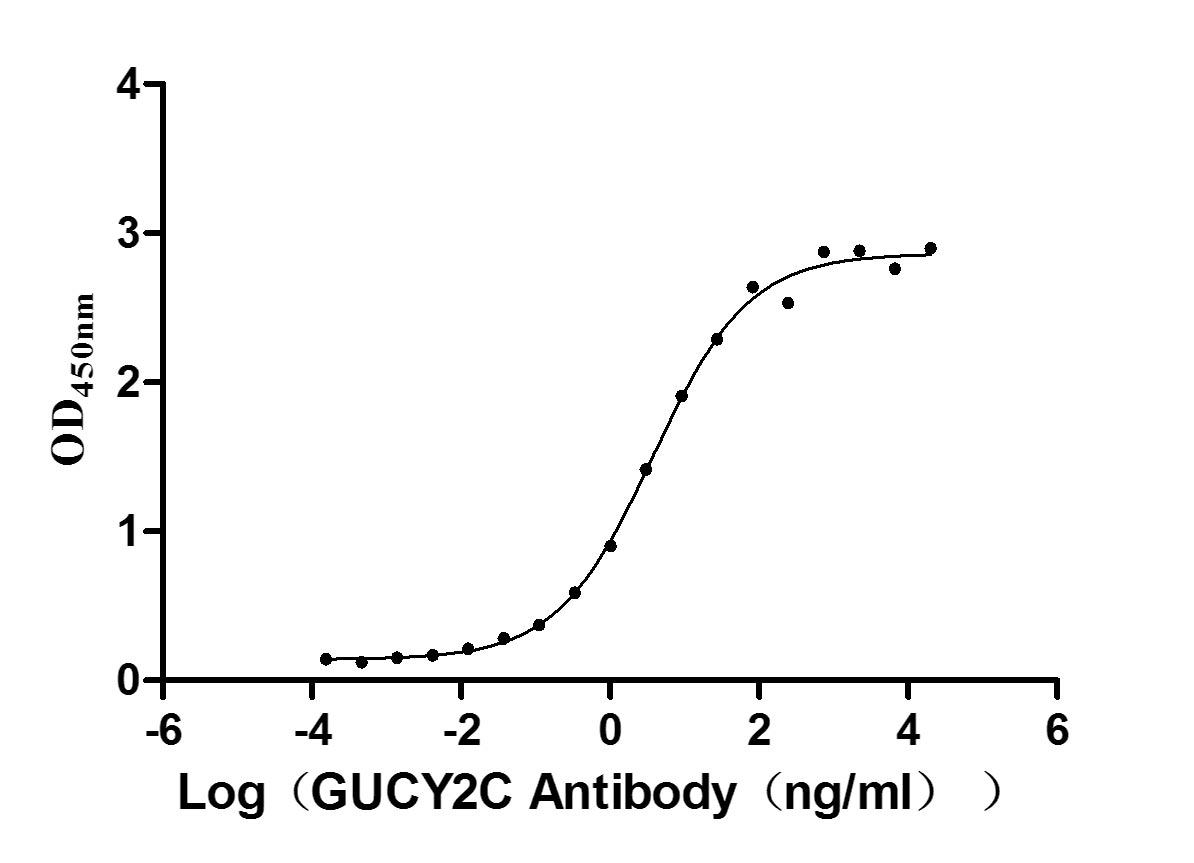
-AC1.jpg)
